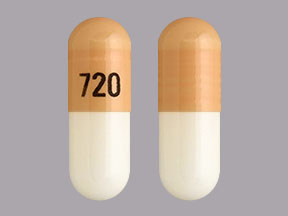Budesonide Disease Interactions
There are 7 disease interactions with budesonide.
- Hepatic impairment
- Infections
- Lactose intolerance
- Ocular herpes simplex
- Ocular toxicities
- Osteoporosis
- Hyperadrenocorticism
Inhaled corticosteroids (applies to budesonide) hepatic impairment
Moderate Potential Hazard, Moderate plausibility. Applicable conditions: Liver Disease
Corticosteroids are predominantly cleared by hepatic metabolism and impairment of the liver function may lead to their accumulation. Patients with hepatic disease should be closely monitored.
Inhaled corticosteroids (applies to budesonide) infections
Moderate Potential Hazard, Moderate plausibility. Applicable conditions: Infection - Bacterial/Fungal/Protozoal/Viral, Tuberculosis -- Latent
The immunosuppressant and anti-inflammatory effects of corticosteroids, particularly in higher dosages, may decrease host resistance to infectious agents, decrease the ability to localize infections, and mask the symptoms of infection. Secondary infections may be more likely to develop. Therapy with corticosteroids should be administered cautiously in patients with an infection, particularly active or quiescent tuberculosis or in hepatitis B carriers. Monitor patients for any new or worsening infection and use with caution in these patients. A serious or even fatal course of chickenpox and measles can occur in susceptible patients. It is important that the recommended dosages of the individual products not be exceeded and that the lowest effective dosage be used.
Inhaled corticosteroids (applies to budesonide) lactose intolerance
Moderate Potential Hazard, Moderate plausibility.
Some inhaled corticosteroid formulations contain lactose and may cause adverse reactions including cough, wheezing and bronchospasm in patients with severe milk protein allergy or intolerance. Caution is advised.
Inhaled corticosteroids (applies to budesonide) ocular herpes simplex
Moderate Potential Hazard, Moderate plausibility.
Pharmacologic dosages of corticosteroids may increase the risk of corneal perforation in patients with ocular herpes simplex. Therapy with inhaled and nasal corticosteroids should be administered cautiously in such patients.
Inhaled corticosteroids (applies to budesonide) ocular toxicities
Moderate Potential Hazard, Low plausibility. Applicable conditions: Glaucoma/Intraocular Hypertension, Cataracts
Prolonged use of corticosteroids may cause posterior subcapsular cataracts and elevated intraocular pressure, the latter of which may lead to glaucoma and/or damage to the optic nerves. Therapy with corticosteroids should be administered cautiously nonetheless in patients with a history of cataracts, glaucoma, or increased intraocular pressure. Although adverse effects of corticosteroids may be minimized by local rather than systemic administration, the risks are not entirely abolished. Inhaled and nasally applied drug may be absorbed into the circulation, especially when large doses are used. It is important that the recommended dosages of the individual products not be exceeded and that the lowest effective dosage be used.
Inhaled corticosteroids (applies to budesonide) osteoporosis
Moderate Potential Hazard, Moderate plausibility.
Prolonged use of inhaled corticosteroids may be associated with a reduction in bone density. This effect appears to be dose-related and has been reported primarily with high dosages (800 mcg/day or more of beclomethasone or equivalent for 1 year or greater). Reduced levels of total body calcium have also been demonstrated in patients receiving lower dosages. Long-term therapy with inhaled and nasal corticosteroids should be administered cautiously in patients with osteoporosis. It is important that the recommended dosages of the individual products not be exceeded and that the lowest effective dosage be used.
Inhaled/nasal corticosteroids (applies to budesonide) hyperadrenocorticism
Moderate Potential Hazard, Moderate plausibility.
The use of corticosteroids may rarely precipitate or aggravate conditions of hyperadrenocorticism. Although adverse effects of corticosteroids may be minimized by local rather than systemic administration, the risks are not entirely abolished. Inhaled and nasally applied drug may be absorbed into the circulation, especially when large doses are used. It is important that the recommended dosages of the individual products not be exceeded and that the lowest effective dosage be used. The development of symptoms such as menstrual irregularities, acneiform lesions, cataracts and cushingoid features during inhaled or nasal corticosteroid therapy may indicate excessive use.
Budesonide drug interactions
There are 527 drug interactions with budesonide.
Budesonide alcohol/food interactions
There is 1 alcohol/food interaction with budesonide.
More about budesonide
- budesonide consumer information
- Check interactions
- Compare alternatives
- Pricing & coupons
- Reviews (144)
- Drug images
- Side effects
- Dosage information
- During pregnancy
- Support group
- Drug class: glucocorticoids
- Breastfeeding
Related treatment guides
Drug Interaction Classification
| Highly clinically significant. Avoid combinations; the risk of the interaction outweighs the benefit. | |
| Moderately clinically significant. Usually avoid combinations; use it only under special circumstances. | |
| Minimally clinically significant. Minimize risk; assess risk and consider an alternative drug, take steps to circumvent the interaction risk and/or institute a monitoring plan. | |
| No interaction information available. |
Further information
Always consult your healthcare provider to ensure the information displayed on this page applies to your personal circumstances.


